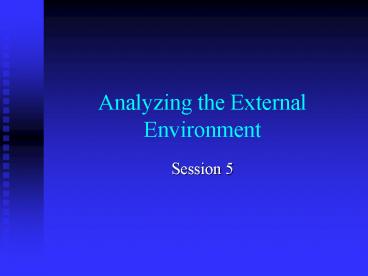Analyzing the External Environment - PowerPoint PPT Presentation
1 / 21
Title:
Analyzing the External Environment
Description:
Source: Yamaha web site. Political and legal environment ... Arctic Cat, Yamaha, Polaris, Bombardier. Limitations. Dynamics of competing ... – PowerPoint PPT presentation
Number of Views:274
Avg rating:3.0/5.0
Title: Analyzing the External Environment
1
Analyzing the External Environment
- Session 5
2
When an industry with a reputation for difficult
economics meets a manager with a reputation for
excellence it is usually the industry that
keeps its reputation intact. - Warren
Buffett
3
Industrial Organization View
- Profitability is a function of industry structure
- Positioning is everything
- Alternative approach Resource dependency theory
- Proactive view
- Seeks to manage environment through bridging and
buffering.
4
Porters Five Forces Model
- Factors shaping industry competition
- Risk of new entry
- Existing rivalry between firms
- Power of buyers
- Power of suppliers
- Threat of substitutes
5
Entry of potential competitors
- Entry barriers
- Product differentiation
- Absolute cost advantages- Proprietary product
technology, access to raw materials, favorable
locations, Government subsidies, learning curve,
Government policy - Capital requirements
- Switching costs
- Access to distribution channels
- Economies of scale
- Governmental regulation
6
Potential Entrants
- Expected retaliation
- History of retaliation
- Established firms with resources
- Slow industry growth
7
Existing Rivalry
- Industry competitive structure
- Fragmented / Consolidated
- Competitors are diverse in strategies, origins
personalities - Demand conditions
- Exit barriers
- Specialized investment
- High cost of exit
- Emotional attachment
- Economic dependence
8
Exit Barriers and Entry Barriers
Low Exit Barriers High
Low
Entry Barriers High
9
Prisoners Dilemma
Player A
Co-operate
Defect
Co-operate
Player B
Defect
10
Power of Buyers
- Concentrated or purchase large volumes
- Product represents a significant fraction of cost
of purchases - Products are standard
- Low switching costs
- Buyers can vertically integrate backwards
11
Power of Suppliers
- Few substitutes available
- Differentiated product
- Threat of forward vertical integration
12
Strategic Groups
- Differences in firm strategies within an industry
- Close competition within a strategic group
- Porters 5 competitive forces can have
differential impacts across strategic groups - Mobility barriers to movement across groups
13
Role of the Macroenvironment
- Macroeconomic
- Economic growth
- Interest rates
- Currency exchange rates
- Inflation rates
- Technological
- Rate of technological change
- Kind of technological change
- Competence enhancing/destroying
14
Macroenvironment
- Social
- Health conciousness
- Demographic
- Political and Legal
- Deregulation
- Environmental restrictions
15
Snowmobiles and the EPA
Source Yamaha web site
16
Political and legal environment
- New emission standards for snowmobiles, ATVs
- Driving force social environment
- Environmentalists concern for wilderness areas,
national parks - Implications for manufacturers
- Arctic Cat, Yamaha, Polaris, Bombardier
17
Limitations
- Dynamics of competing
- Insulation/control (barriers to entry)
- Creating a weakness
- Static view
- Innovation as a driver of competitive structure
- Industry evolution not considered
- Focus on industry, not on firm
- Alternative Resource based view Firm
capabilities drive profitability
18
Value Innovation New approach to external
analysis
- Create products/services for which there are no
direct competitors - Looking across
- Industry boundaries Home Depot, Intuit
- Strategic groups Polo Ralph Lauren, Toyota
Lexus - Buyer groups Bloomberg
- Complementary Products/Services Barnes Noble,
Borders - Functional/ Emotional appeal Starbucks
- Time Cisco Systems
Source Kim Mauborgne
19
Industry life cycle
- Embryonic
- Growth
- Shakeout
- Mature
- Declining
20
Globalization and Industry Structure
- Globalization
- Marketing, Production and RD
- Implications of globalization
- Foreign competitors
- Increased competition
- Accelerated rate of innovation
- Opportunity for growth (removal of trade and
investment barriers)
21
National competitive advantage
- Factor endowments
- Demand conditions
- Related and supporting industries
- Intensity of rivalry

